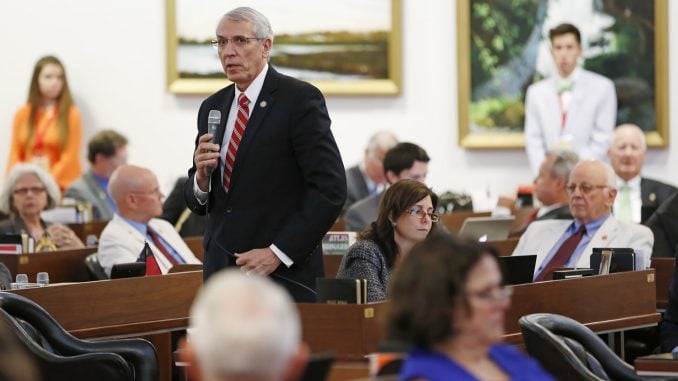
RALEIGH The N.C. House of Representatives Appropriations Committee is meeting Wednesday morning, working on its budget proposal after initially announcing an aggregate spending level of $22.9 billion that matches the total appropriations level as proposed by the N.C. Senate. The House Finance Committee passed several tax reforms Tuesday morning to be included in the final House budget plan.The House budget tax proposals introduced would increase the standard deduction by $1,000, from $17,500 to $18,500, for married filing jointly taxpayers and surviving spouses, by $800 for heads of household, and by $500 for single and married filing separately taxpayers.The tax proposals differ from the Senate plan in the degree and areas of tax relief offered. For example, the Senate plan raises the standard deduction to $20,000 for married couples filing jointly, while also lowering the personal income tax rate.”There are differences between the (House and Senate) finance packages, but I assure you that the goal of both finance packages is exactly the same,” said House Finance Chairman Rep. John Szoka (R-Cumberland). “To continue the good work that we have accomplished since 2011; to continue to be respectful of taxpayers’ dollars; to continue to modernize our tax code and to make North Carolina the best economically performing state in the union.”Popular deductions were also increased as part of the House budget tax plan, raising caps on mortgage expense and property tax deductions. Effective Jan. 1, 2019, the cap on such deductions is raised by 10 percent, from $20,000 to $22,000.Some business taxes are also lowered in the House proposal, specifically those businesses subject to franchise taxes. Those businesses are currently taxed at a rate of $1.50 per $1,000 of franchise value, but the House plan reduces that rate to $1.40 with a minimum tax of $200 and a maximum of $150,000. A staple of the Senate’s billion dollar tax cut proposal, corporate income tax rate reductions have not thus far been included in the House plans.”Lower taxes in itself is a great economic incentive both for companies that have been here for quite some time and those that we’re trying to attract to North Carolina,” said Szoka.Beyond those reforms, the House Finance Committee passed a number of targeted tax exemptions for certain equipment purchases. Facilities used primarily for receiving, inventorying, sorting, repackaging and distributing finished retail products for the purpose of fulfilling customer orders will get sales tax exemptions for the purchase of distribution equipment.”We have all seen the economy transition, and we want to encourage manufacturing here in North Carolina,” said Szoka. “We also recognize there has been a huge increase in fulfillment centers. These fulfillment centers typically take a great deal of investment and they employ a lot of people. We have actually missed opportunities the last few years because we haven’t recognized the role these fulfillment centers are now playing in our economy.”Purchases of mill machinery will also get a sales tax exemption under the House plan, removing the current 1 percent sales tax on such equipment.Further, the plan creates a new sales tax refund for small and rural research and development businesses. The maximum total amount of refunds allowed to all eligible businesses in a calendar year would be capped at $15 million.”This is targeted at biotech industries and other capital intensive small startups,” explained Szoka. “Research and Development is a competitive advantage in North Carolina and we want to best leverage innovations occurring in our universities and encourage entrepreneurship. When you talk to the biotech industry and the IT industry and these highly technical small businesses that are sprouting up around the state, we believe that for a very small investment this will facilitate businesses growing and actually attract more capital to the state.”Full details of the House budget plan are not yet available, but are expected to be released and voted on this week. So far provisions of the House proposal appear to focus more on targeted reforms, as opposed to a Senate plan that continues sweeping tax reductions across multiple categories. Once a final House budget is complete and voted on, the process of reconciliation with the Senate proposal will start in earnest.Lawmakers have repeatedly indicated plans to approve a biennial budget and adjourn the 2017 session by the end of June.



